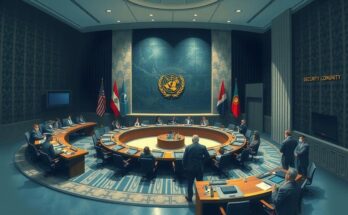Donald Trump’s return to the presidency generates varied reactions from the Subcontinent, with Pakistan anticipating continued strained relations, Bangladesh expressing cautious optimism amidst concerns over trade and climate policy, Nepal warning against authoritarianism, and Sri Lanka reflecting skepticism about democracy and potential foreign policy shifts. Each country is carefully analyzing how Trump’s presidency could reshape or impact their geopolitical destinies.
Donald J. Trump, the former President of the United States, has made a significant return to the White House, having won the recent elections held on November 5, 2024. His previous tenure ended with a defeat against Democrat Joe Biden in 2020. While the discourse in America has largely revolved around the implications of Trump’s presidency on global issues such as the Middle East and the Russia-Ukraine conflict, there is a noticeable void in discussions concerning his potential impact on the Subcontinent, particularly Pakistan, Bangladesh, Nepal, and Sri Lanka. Each of these nations has expressed distinct perspectives on Trump’s return, encapsulating their expectations and apprehensions regarding future bilateral ties and regional dynamics. In Pakistan, the editorial from Dawn highlights economic factors, such as high inflation, and political rhetoric as influencing Trump’s victory. The piece argues that the prior administration’s cooling of relations with Pakistan indicates little change is anticipated despite Trump’s re-election. Bangladesh’s Daily Star notes the sharp electoral margin that led to Trump’s control over both the Senate and potentially the House. Concerns regarding Trump’s perceived view of Bangladesh through the lens of Indian relations, as well as trade and climate change policies, are prevalent, although there is cautious optimism for future cooperation, as expressed by Chief Adviser Prof. Muhammad Yunus. The Kathmandu Post from Nepal presents a critical view, suggesting Trump’s ability to connect with voter sentiments has overshadowed rational discourse. It draws parallels between the political landscapes of the U.S. and Nepal, warning against the allure of authoritarian leadership in times of social media-driven politics. In Sri Lanka, The Island articulates skepticism regarding Trump’s presidency and its implications for democracy, while also speculating about potential shifts in trade and foreign policy strategies. The piece concludes somewhat ambiguously, suggesting Trump’s second term might not necessarily be better than Biden’s but expressing hope for improved relations. The commentary from the four Subcontinental nations underscores a complex mix of apprehension and tentative optimism for the evolving dynamics following Trump’s electoral victory, specifically relating to trade, immigration, and geopolitical stances.
The article discusses the aftermath of Donald Trump’s election victory in November 2024, focusing on reactions from various countries in the Subcontinent, namely Pakistan, Bangladesh, Nepal, and Sri Lanka. It aims to provide insights into how Trump’s policies are anticipated to affect bilateral ties and regional relations, emphasizing the diverse perspectives of each country as they respond to Trump’s return to power and the historical context of U.S.-Subcontinental relations. The commentary encapsulates domestic and international factors influencing these nations’ responses to Trump’s presidency, revealing a mixture of expectations and concerns.
The responses from the Subcontinental press reflect a spectrum of views concerning Donald Trump’s victory. While some express concerns about potential deterioration in relations and repercussions on global issues, others remain cautiously optimistic about the future of bilateral ties. The overall sentiment underscores the complexities of international relations and the diverse expectations countries hold regarding U.S. foreign policy shifts under Trump’s administration.
Original Source: indianexpress.com




